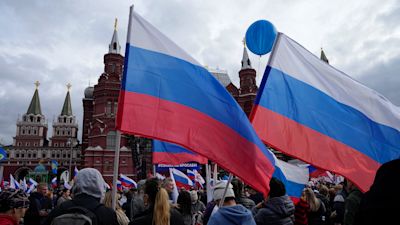Russia says journalists and IT workers are exempt from military mobilisation as men flee country

Russia's Ministry of Defence has revealed a list of exemptions relating to the recently announced "partial mobilisation" of its military forces.
Earlier this week, Russian President Vladimir Putin signed a decree ordering the conscription of around 300,000 reservists, as it seeks to boost troop numbers for the ongoing invasion of Ukraine.
In a rare television address he said the decision to mobilise troops in Russia - for the first time since World War II - was “fully adequate to the threats we face".
Since the order was announced military-aged men have been fleeing Russia in their droves.
But it has now been clarified that IT workers, bankers and journalists will not be called up to fight.
Those who meet the criteria need their employers to submit an official letter, confirming their occupation status, to the offices of the ministry.
The decision was welcomed by the country's Ministry of Digital Development, which said it "supports the decision of the Ministry of Defense to grant the right to deferment from mobilisation for employees of priority high-tech sectors of the economy".
It said the exemption of those workers would help to "ensure the sustainable functioning of critical information" and "provide prompt information to the population of the country".
Want a quick and expert briefing on the biggest news stories? Listen to our latest podcasts to find out What You Need To Know
This week world leaders have renewed calls for Russia to end its invasion, during a meeting of the United Nations (UN) General Assembly, in New York.
US President Joe Biden said that Moscow had “shamelessly violated the core tenets" of the UN charter with its “brutal, needless war” in Ukraine.
On Friday, queues stretching for 10 kilometres (six miles) formed on a road leading to the southern border with Georgia, according to Yandex Maps - a Russian online map service.
The lines of cars were so long at the border with Kazakhstan that some people abandoned their vehicles and proceeded on foot - just as some Ukrainians did after Russia invaded their country in February.
Meanwhile, dozens of flights out of Russia - with tickets sold at sky-high prices - carried men to international destinations such as Turkey, Armenia, Azerbaijan and Serbia, where Russians don't need visas.
However, Russians, who are fleeing the country, are not able to fly directly to the UK or any of the European Union's (EU) 27 member states, after flights were banned shortly after the invasion began.
Recently, the EU has agreed to limit issuing Schengen visas, which allow free movement across much of Europe.
Four out of five member states which border Russia - Latvia, Lithuania, Estonia and Poland - have also decided to turn away Russian tourists.
The one EU country which is still accepting Russians with Schengen visas is Finland, which has a 1,340-kilometre (830-mile) border with Russia.
Finland border guards said that the number of people entering from Russia, on Friday, had grown, with local media reporting a 107% increase compared with last week.